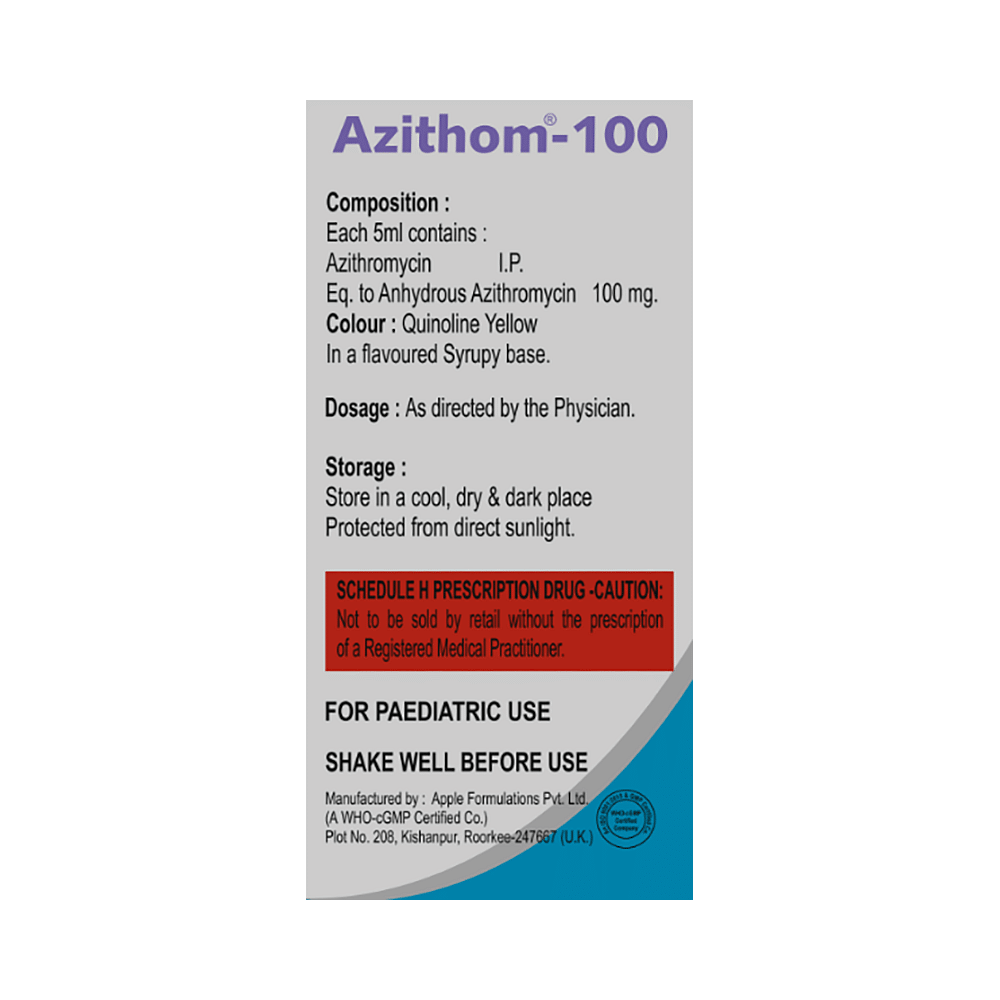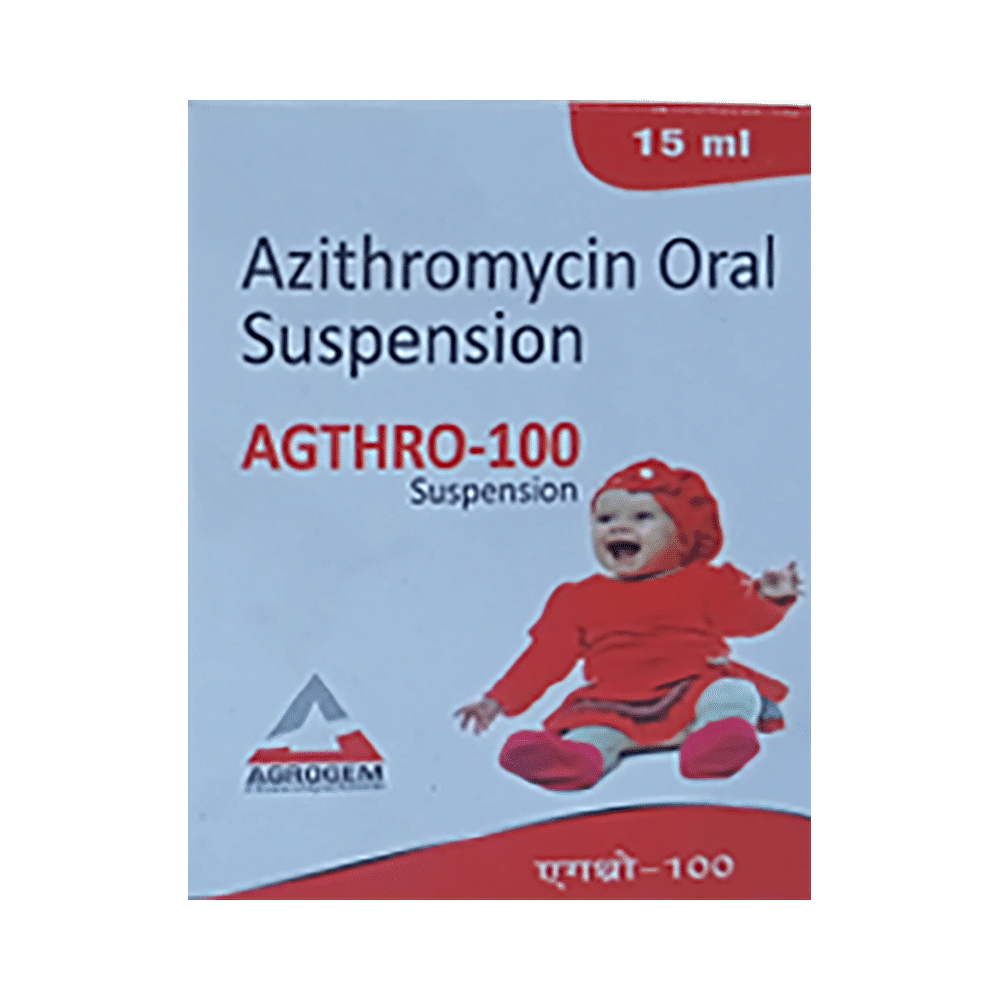
Azithom 100 Oral Suspension
Manufacturer
Om Biotec
Salt Composition
Azithromycin (100mg)
Key Information
Short Description
Azithom 100 Oral Suspension is an antibiotic medication used to treat a wide range of bacterial infections in children.
Dosage Form
Oral Suspension
Introduction
Azithom 100 Oral Suspension is an antibiotic medication commonly given to children for the treatment of a wide range of bacterial infections targeting the ear, eyes, nose, throat, lungs, skin, and gastrointestinal tract.
Directions for Use
Give Azithom 100 Oral Suspension with food to avoid an upset stomach. Encourage your child to drink plenty of water in case diarrhea develops as a side effect.
How it works
Azithom 100 Oral Suspension is an antibiotic. It works by interfering with the synthesis of essential proteins required by bacteria to perform important functions. By doing so, it stops the infection-causing bacteria from growing further and prevents the infection from spreading.
Quick Tips
Your child must complete the entire course of this medicine. Stopping too soon may cause the bacteria to multiply again Give Azithom 100 Oral Suspension with food to avoid an upset stomach. Encourage your child to drink plenty of water in case diarrhea develops as a side effect. Only give Azithom 100 Oral Suspension to your child for their current infection. Never save medicine for future illnesses. Stop the medicine and contact the doctor immediately if your child develops an itchy rash, facial swelling, and breathing difficulties soon after the intake.
Related Medicines

Zady 100 Readymix Suspension

Ibithral 100mg Oral Suspension

Azichem 100mg Oral Suspension

Agthro 100 Oral Suspension

Aziral Oral Suspension

Azimak 100mg Oral Suspension

Izabof 100mg Oral Suspension

Aziright 100mg Oral Suspension

Zithpe 100mg Oral Suspension

Aziwell 100 Oral Suspension
Frequently asked questions
What if I accidentally give my child too much Azithom 100 Oral Suspension?
If you think you have given too much Azithom 100 Oral Suspension to your child, it is essential to consult a doctor immediately. While an extra dose is unlikely to cause harm, an overdose may lead to unwanted side effects and potentially worsen your child's condition.
Are there any serious side effects of Azithom 100 Oral Suspension?
Yes, some serious side effects of Azithom 100 Oral Suspension include persistent vomiting, kidney damage, allergy, diarrhea, and severe gastrointestinal infections. If you notice any of these symptoms, consult your child's doctor for guidance and support.
Can I give other medicines to my child while they are taking Azithom 100 Oral Suspension?
It is crucial to inform your child's doctor about any other medicines they are taking before starting Azithom 100 Oral Suspension. Additionally, consult your doctor before giving any other medicines to your child while they are taking Azithom 100 Oral Suspension, as it may interact with other substances.
Can my child receive vaccinations while taking Azithom 100 Oral Suspension?
Antibiotics like Azithom 100 Oral Suspension do not typically interfere with vaccine ingredients or cause adverse reactions in children who have just been vaccinated. However, it is recommended to wait until your child has recovered from their illness before getting vaccinated. Once they have recovered, the vaccine can be administered.
What lab tests should my child undergo while taking Azithom 100 Oral Suspension long-term?
Your child's doctor may recommend periodic kidney function tests and liver function tests to monitor their condition while taking Azithom 100 Oral Suspension long-term.
Can Azithom 100 Oral Suspension affect my child's digestion?
Yes, children may experience stomach upset while taking Azithom 100 Oral Suspension, as it can kill off good bacteria in the gastrointestinal tract along with the bad bacteria. If your child develops diarrhea while taking Azithom 100 Oral Suspension, do not stop the medicine course. Instead, consult your child's doctor for guidance on the next steps.
Why is Azithom 100 Oral Suspension given for 3 days?
The duration of treatment with Azithom 100 Oral Suspension depends on the type of infection being treated and the patient's age. It is not necessarily given for 3 days. The doctor will advise the appropriate regimen based on your child's specific condition.
What should I avoid while taking Azithom 100 Oral Suspension?
It is recommended to avoid taking antacids with Azithom 100 Oral Suspension, as this can affect its effectiveness. Additionally, patients taking Azithom 100 Oral Suspension should avoid exposure to sunlight or tanning beds, as it may increase the risk of sunburn.
Is Azithom 100 Oral Suspension a strong antibiotic?
Yes, Azithom 100 Oral Suspension is an effective antibiotic used to treat various bacterial infections. Its longer half-life allows it to be given once a day for a shorter duration, making it a convenient treatment option.
Can I get a yeast infection from taking Azithom 100 Oral Suspension?
Yes, some people may develop a fungal or yeast infection, such as thrush, after taking Azithom 100 Oral Suspension. This is because antibiotics like Azithom 100 Oral Suspension can kill off the normal bacteria in the intestine, leading to an overgrowth of yeast. Inform your doctor if you experience any symptoms of thrush, such as a sore or vaginal itching or discharge, or a white patch in the mouth or tongue.


